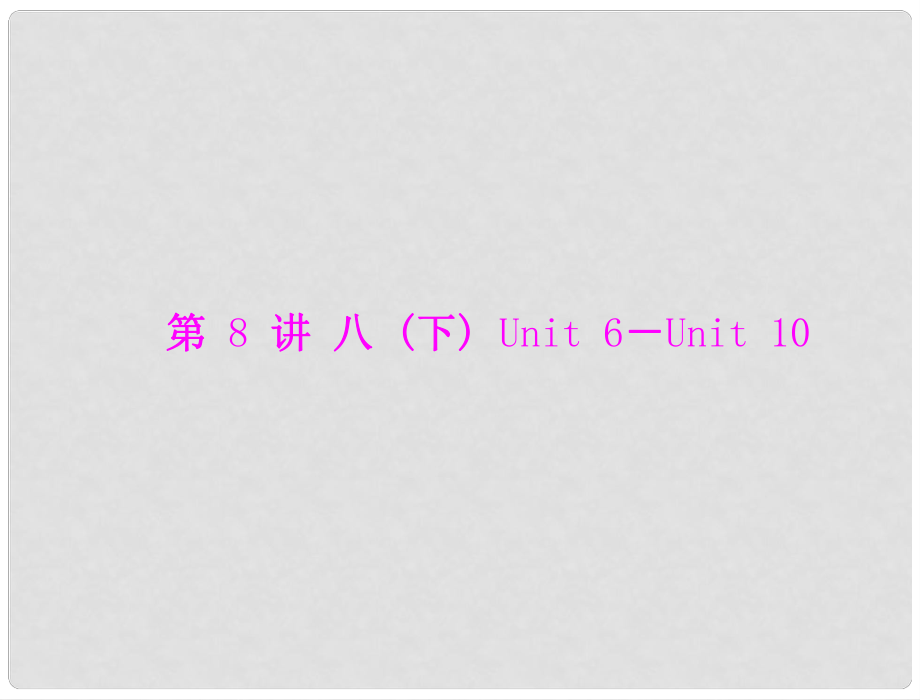《中考英語復(fù)習(xí) 第一部分課本講解 第8講 八年級下冊 unit 6unit 10課件》由會員分享����,可在線閱讀,更多相關(guān)《中考英語復(fù)習(xí) 第一部分課本講解 第8講 八年級下冊 unit 6unit 10課件(11頁珍藏版)》請在裝配圖網(wǎng)上搜索����。
1、第第 8 講講 八八 ( (下下) ) Unit 6Unit 101.allow (allowed, allowed) vt.允許����,準(zhǔn)許短語搜索短語搜索allow sb._ sth.允許某人做某事allow _ sth.允許做某事2.receive (received, received) v.收到,得到短語搜索receive sth._ sb.從某人處收到某物fromreceive _ sb. _ a _ sb. _ sb.收到某人的信gethear fromto dodoinga letter fromletter from辨一辨辨一辨receive/acceptreceive 指客觀上“
2�、收到”某種東西,相當(dāng)于 get����,而 accept指主觀上同意并“接受”某種東西或理念。即景活用即景活用我收到了他的禮物�,但我并沒有接受它�。I _ a gift from him, but I didnt _ it.accept3.encourage (encouraged, encouraged) vt.鼓勵短語搜索短語搜索encourage sb._ sth.鼓勵某人做某事encourage sb._ sth.在某方面鼓勵某人receivedto doin4.population n.人口,人數(shù)用法歸納(1)表示一個城市����、地區(qū)或國家的人口時���,常用以下兩種句型:the population o
3、f某地is數(shù)詞某地has a population of數(shù)詞(2)表示人口“多或少”用 large 或 small����。(3)詢問“有多少人口”時用 what 或 how large,而不能用how many 或 how much�。(4)population 與定冠詞 the 連用作主語時,謂語動詞用單數(shù)���;被分?jǐn)?shù)或百分?jǐn)?shù)修飾作主語來強調(diào)一部分人時�,謂語動詞應(yīng)用復(fù)數(shù)���。5.right away (immediately) 立即����,馬上短語搜索短語搜索atright away_ once 立即�,馬上6.take care 當(dāng)心;小心短語搜索短語搜索carefuloutouttake carebe _loo
4�、k _watch _ 當(dāng)心;小心7.rather than 而不是用法歸納用法歸納rather than 通常連接兩個并列成分���,如兩個名詞����、代詞、形容詞�、介詞短語、動詞���、不定式等����。短語搜索短語搜索would rather._.寧愿而不愿would._.寧愿而不愿8.be/become interested in (doing) 對(做)感興趣短語搜索_ an interest in 對感興趣takethanrather e along (意外地)出現(xiàn)����;發(fā)生;來到短語搜索truecome _ 回來�;想起來come _ 實現(xiàn)come _ 出版;出現(xiàn)outcome _ 追上����,趕上;想出(主意)���;找出
5、(答案)come _ (偶然)遇見(或發(fā)現(xiàn))come _ 下落,下來come _ 出生(于)���,來自come _ 進入���,進來come _ 來吧,趕快come _ 共計����,達到tobackup withacrossdownfrominon1.Would you mind doing.?你介意做嗎���?用法歸納(1)其否定形式為“Would you mind not doing.�?”���。(2) 答語若表示不介意�,常用 “Not at all./Certainly not./Ofcourse not.” 等����。如果介意,?;卮?“Im sorry, but I ./Youdbetter not.”等。(3)表示
6���、相似含義的常用表達還有:Would you mind ones doing.?你介意某人做嗎�?Would/Do you mind if從句?如果你介意嗎���?即景活用即景活用你介意我打開窗嗎���?Would you mind _ the window?opening2.It is better to do sth.最好做某事用法歸納用法歸納(1)It is better to do sth.相當(dāng)于 had better do sth.,有時也用 Itis best to do sth.來表達����。(2)其否定形式為:Its better not to do sth.,相當(dāng)于 had betternot d
7�、o sth.。3.Why dont you do.����?為什么不做呢?用法歸納“Why dont you do. ���? ” 表 示 給 對 方 提 建 議 �, 相 當(dāng) 于“Why not do. �?”,其肯定回答一般用“Yes, Id love to./Thatsounds good./That is a good idea.” 等 ����, 否 定 回 答 常 用 “It is notspecial/creative enough./That is too personal.”等�。即景活用即景活用為什么不向你的老師求助呢�?_ _ _ _ to your teacher? _ _ _ to your teacher?WhyturnturnWhydontyounot4.強調(diào)句型:Itbe被強調(diào)部分that句子的其他部分用法歸納用法歸納該句型可以用來對句子的主語�、賓語及某些狀語進行強調(diào),但不能用來強調(diào)句子的謂語及形容詞性表語�。強調(diào)主語時,如果指的是人����,可用 who 代替 that。
 中考英語復(fù)習(xí) 第一部分課本講解 第8講 八年級下冊 unit 6unit 10課件
中考英語復(fù)習(xí) 第一部分課本講解 第8講 八年級下冊 unit 6unit 10課件

